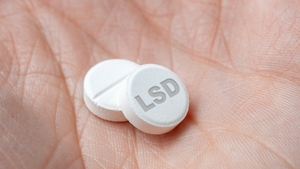Blog Information
- Posted By : Deadhead Chemist
- Posted On : Feb 21, 2022
- Views : 323
- Category : Education
- Description : It was so popular that folks were buying into it until it was flagged as an illegal substance, described as an enemy of the state not too long from its acceptance in the culture.
- Location : Vancouver, BC, Canada
Overview
LSD, also called acid, Lucy, or lysergic acid diethylamide, is famous in the psychedelic family. Each word of the name has a connotative meaning, like the psychedelic, a Greek word that means soul or psyche, or to reveal. The whole world of LSD is too vast that it may even require creating a faculty to considerably exhaust its research work, as quoted by Don Lattin, the author of The Havard Psychedelic Club. LSD has other local names like a blotter, dots, windowpane, and a series of different names.
Before its significant reverse-culture movement (the 1960s) and the recurrent psychedelics resurgence, its effects were realized by users in the 1940s. It has been subtly shown in movies, music videos, and festivals such as the Bumbershoot festival, Wikimedia Commons, etc. Users describe it as helping them reconnect with their natural essence and human consciousness rather than gathering stuff—Steve Jobs was an example.
It is a medium for expanding consciousness, fun, sobriety, treatment of mental health conditions like anxiety, addiction, etc. However, those with underlying health conditions should take caution or entirely avoid it. It will be true to define that taking acid (LSDs) are interestingly the most used psychedelic in many musical events, camps, etc. One in 10 of the American population has used LSD at least once throughout their lives. It is a pivotal game-changer in the psychedelic movement.
For your microdose LSDs, click here.
What is Acid? What is LSD?
LSD belongs to class Lysergamide and is chemically produced in the laboratory. Also, they are found in nature, like the ergotamine, which is gotten from the ergot fungus. It became famous during the counterculture movement of the 1960s by a group of Havard researchers like Timothy Leary and Richard Alpert. It has a significant effect on cultures, like impacts on musical groups, tech geeks, and medical practitioners when they use it in therapies before it becomes illegal.
The mannerism of acid with the brain is not comprehended yet from the lens of biochemistry. However, LSD behaves like serotonin and influences other neurotransmitters, which affects cognition and behavior, which further brings about the perception variations that accompany LSDs.
Lysergic Acid Diethylamide: History
The story is centered on the founder, Albert Hoffman, a Swiss Chemist and pharmaceutical researcher. He worked on ergot, a fungus growing on rye and grains, after first synthesizing LSD in the 1930s. He was looking for a different result for respiratory and circulatory stimulants when he stumbled on the new substance. The result was not the concern to the pharmacologists, and doctors, work discontinued—though Hoffman had his tabs on the results.
Interestingly, Hoffman described the whole experience as LSD speaking to him during his research. He said in his narrative that the substance asked him not to hand it over to doctors or pharmacists as they would not understand its potency. He called it the “medicine of the soul” and a critical drug for treating several medical ailments.
It was so popular that folks were buying into it until it was flagged as an illegal substance, described as an enemy of the state not too long from its acceptance in the culture. This legal declaration made it difficult to mass-produce the drug for general use except for research purposes which only need a little above average production rate.
LSD Trip
The LSD trip can be a challenging experience but also a magical one. Hunter S. Thompson used the word “intensity”; he describes the journey that it should move gradually from a low tempo to a higher one. We recommend using it in relatively comfortable situations, preferably not socially tense. One may experience shapes in several geometries, images, color, or perceiving things differently.
With results gotten from brain imaging from the Imperial College, London, for patients who are LSD psychonauts, there seems to be a considerable activity experienced in the visual cortex. It hinders the brain from operating other functions but maintains a euphoric oneness experienced by these users.
LSD trips could span between 8 to 12 hours. However, the experiences vary with persons, and also, dosing poses an effect on the length. While on acid, time can be fragmented and distorted by the LSD tripper.
aThere are several effects that LSD has on users. Influences range from overwhelming experiences like upbeat heart rate, body temperature, distortion of sensory organs, euphoria, hallucinations, psychosis, or depression, as the case may be. Before attempting LSDs, seek professional help as some experiences can be very harmful.
However, irrespective of the experiences, do well not to label them as “bad trips .” In surviving a harrowing psychedelic experience, psychedelic gurus advise breathing, playing a mind game on acceptance, having a sitter, engaging possible distractions, etc., interestingly; acids are very potent as they can alter human perceptions, processes, and behavior.
LSDs can make the brain neuroplastic as they can change form over time. Each person’s experience can determine the change in the brain, either from positive to negative or vice versa. However, the healing potential is the center of each occasion—it is mystical. LSDs bring their users to a sense of self and eliminate existing fears—it connects the brain with its environment, even spirituality.
Resource Blog : https://deadheadchemist.com/lsd-everything-you-should-know/
